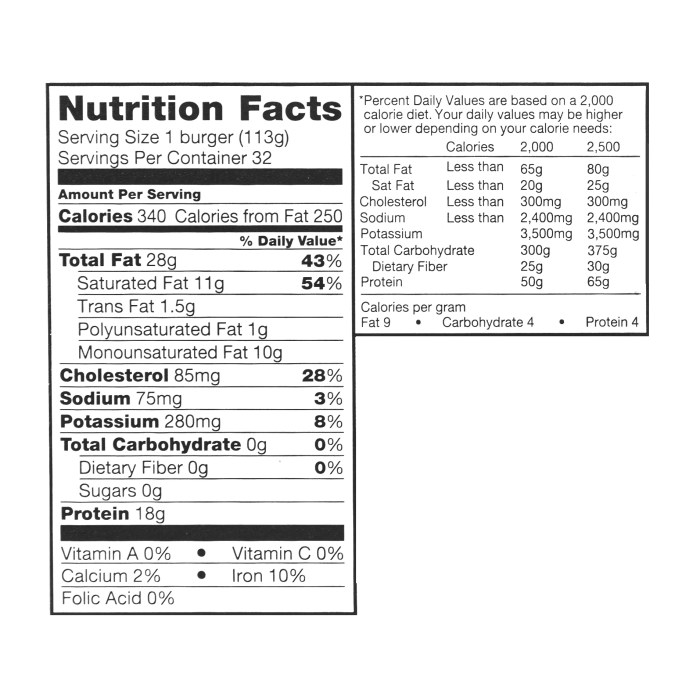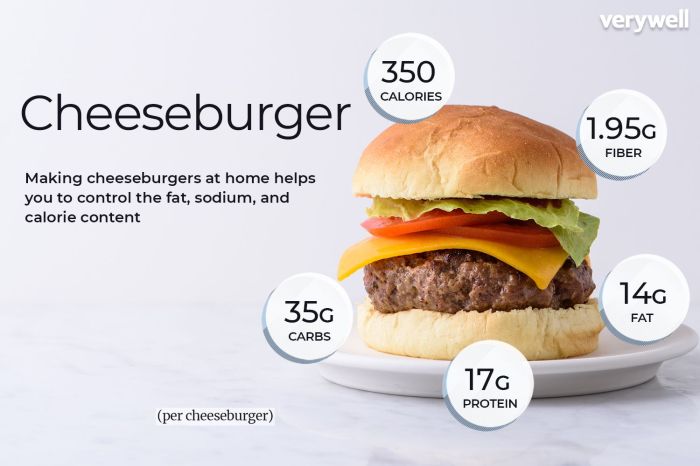Micronutrient Content and Dietary Significance: Burger Patty Nutrition Facts

Burger patty nutrition facts – Burger patties, particularly those made from beef, offer more than just protein and fat. They contain a variety of micronutrients, essential vitamins and minerals that play crucial roles in maintaining good health. While the exact micronutrient content can vary depending on the type of beef, the animal’s diet, and the patty’s preparation method, understanding the potential nutritional benefits is important for balanced eating.Beef patties contribute to the daily intake of several essential micronutrients.
These nutrients work together to support various bodily functions, from energy production and immune function to bone health and nerve function. A balanced diet incorporating lean protein sources like beef patties, alongside fruits, vegetables, and whole grains, is key to optimal health.
So you’re checking the burger patty nutrition facts, right? Maybe you’re thinking about adding a side of something a little healthier, like a crisp Granny Smith apple – check out the nutrition facts granny smith apple to see how it compares! Then you can get back to agonizing over whether that extra patty is worth the sodium.
It’s a tough life, choosing between burger bliss and nutritional righteousness.
Micronutrients in Beef Patties and Their Roles
Beef patties provide several important micronutrients. The quantities can vary depending on factors such as the cut of beef and how it is prepared. However, the presence of these nutrients makes beef a contributor to a healthy diet.
- Iron: Essential for oxygen transport in the blood and crucial for energy production. Iron deficiency can lead to anemia, characterized by fatigue and weakness. A 3-ounce beef patty can provide a significant portion of the daily recommended iron intake.
- Zinc: Plays a vital role in immune function, wound healing, and cell growth. Zinc deficiency can impair immune response and lead to various health problems. Beef is a good source of bioavailable zinc, meaning the body can easily absorb and utilize it.
- Vitamin B12: Essential for nerve function, red blood cell formation, and DNA synthesis. Vitamin B12 is primarily found in animal products, making beef a good source for vegetarians who consume it. A deficiency can lead to anemia and neurological problems.
- Niacin (Vitamin B3): Plays a crucial role in energy metabolism, DNA repair, and cell signaling. Niacin deficiency can result in pellagra, a disease characterized by skin rashes, diarrhea, and dementia.
- Selenium: A powerful antioxidant that protects cells from damage caused by free radicals. Selenium contributes to immune function and thyroid hormone metabolism. Beef is a good source of this essential mineral.
Burger Patty Nutritional Labeling and Consumer Information

Understanding the nutritional content of our food is crucial for maintaining a healthy diet. Nutritional labels on packaged foods, like burger patties, provide a standardized way to access this information, allowing consumers to make informed choices about what they eat. However, it’s important to be aware of the limitations and potential discrepancies that can exist.
Sample Nutritional Label for a Beef Burger Patty
The following table provides a sample nutritional label for a typical 4oz beef burger patty. Remember that actual values can vary depending on the specific ingredients and preparation methods used. This is a representative example and should not be considered definitive for all beef burger patties.
| Nutrient | Amount per Serving (4oz) | % Daily Value* |
|---|---|---|
| Calories | 200 | 10% |
| Total Fat | 12g | 15% |
| Saturated Fat | 5g | 25% |
| Cholesterol | 75mg | 25% |
| Sodium | 150mg | 6% |
| Total Carbohydrate | 1g | <1% |
| Dietary Fiber | 0g | 0% |
| Total Sugars | 0g | 0% |
| Protein | 20g | 40% |
| *Percent Daily Values are based on a 2,000 calorie diet. Your daily values may be higher or lower depending on your calorie needs. | ||
Importance of Understanding Nutritional Labels
Nutritional labels empower consumers to make conscious food choices aligned with their dietary needs and health goals. By carefully reviewing the information provided, individuals can monitor their intake of calories, fats, sugars, and other nutrients, helping them manage weight, prevent nutrient deficiencies, and reduce the risk of chronic diseases. For example, someone watching their cholesterol intake would pay close attention to the cholesterol and saturated fat content.
Similarly, individuals with sodium restrictions would carefully check the sodium content.
Potential Discrepancies Between Advertised and Actual Nutritional Values, Burger patty nutrition facts
While nutritional labels aim for accuracy, discrepancies between advertised and actual values can arise. Variations in ingredient sourcing, processing methods, and even the measurement techniques used during manufacturing can lead to minor differences. For instance, a slight variation in the fat content of the ground beef used could alter the final fat content of the patty. Furthermore, the serving size specified on the label might not always align perfectly with how a consumer actually consumes the product.
It’s important to remember that the values on the label represent an average and that minor variations are possible. Larger discrepancies, however, should be reported to the manufacturer.
Query Resolution
What are the best ways to reduce the fat content of a burger patty?
Leaner meats like turkey or chicken offer lower fat content than beef. Trimming visible fat before cooking and opting for grilling or baking over frying also significantly reduces fat intake.
Are there any health benefits to eating burger patties?
Burger patties, particularly beef patties, can be a good source of protein and iron, both essential for muscle growth and overall health. However, the overall health benefits depend heavily on the type of patty and the rest of your diet.
How can I tell if a burger patty is organic?
Look for certifications like USDA Organic on the packaging. Organic patties are produced without the use of synthetic pesticides, herbicides, or fertilizers.
Are veggie burgers always healthier than beef burgers?
Not necessarily. While some veggie burgers are low in fat and calories, others can be high in sodium or processed ingredients. Always check the nutrition label.
